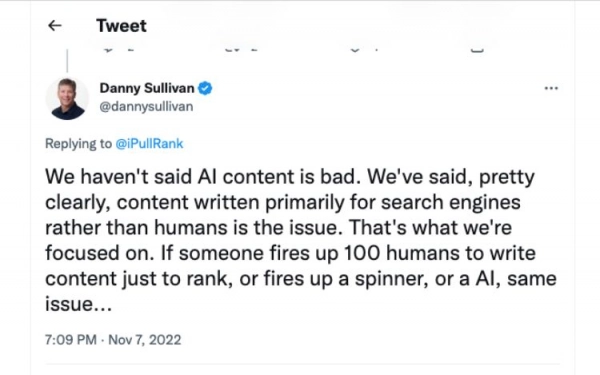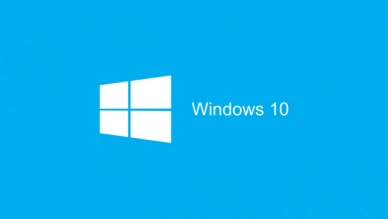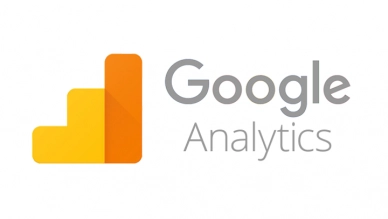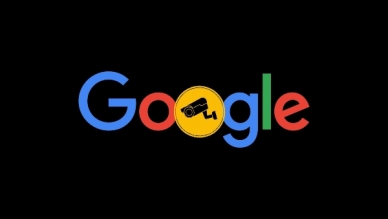Blog sites that will accept AI generated content
The use of AI-generated content in blogs is a growing trend. This raises the question: Do blogs accept AI-generated content? The answer is yes, but for acceptance, the content must meet standards of quality, originality, and ethics.
Combining human creativity with AI efficiency will produce high-quality content that meets readers' needs.
Google’s Changing Perspective on AI Content Tools
Google has revised its policy and no longer claims to oppose all automatically generated content, including that created by AI content tools. Instead, Google evaluates automatically generated content based on its quality assessment standards and takes appropriate measures to ensure search results meet user expectations.

Google’s policy on AI-generated content has changed. In November 2022, Danny Sullivan (Public Liaison for Search at Google) announced on Twitter that Google no longer bans AI-generated content. Previously, Google's Webmaster Guidelines included a prohibition against automatically generated content. These policies were in place for various reasons, including content quality issues. In the past, many websites used AI technology to create low-quality content that did not engage readers, negatively impacting user experience and Google's search result quality.

Additionally, some websites used AI content technology to spam and manipulate search systems, creating numerous landing pages or fake products. This affected the transparency and reliability of search results.
For these reasons, Google had prohibited the use of AI content technology for generating automated content.
However, in April 2022, the company updated its guidelines to specifically address “automatically generated spam content.” Danny Sullivan emphasized this point in November 2022, stating that there would be no violation of Google’s guidelines if AI is used to create content, provided the end result is written for users and not just to optimize search engines. In other words, the goal of the content should be to provide value to users, not merely to manipulate search rankings. Google’s AI content policies are continually updated, so it is advisable to regularly check the official Google information page for updates.
Recently, John Mueller (Google’s SEO expert), who was previously skeptical about AI-generated content, has become more accepting of its use. Mueller confirmed in a Mastodon post in January 2023 that AI can be used for titles and descriptions.
Despite this change, Google may still face a practical challenge: can it detect text or content generated by AI tools? While Google has been able to do this in the past, it may become more challenging as new, more human-like technologies emerge.
Although Google has accepted the use of AI to create content, the company will continue to develop new technologies to detect and prevent spam content and search ranking manipulation using AI-generated content tools.
How Google Evaluates AI Content
Currently, Google accepts AI-generated content if it meets high-quality criteria and is created to provide value to users, not just to optimize SEO. However, Google has strict criteria and regulations for evaluating AI content to ensure the best quality for users.
Google’s AI content evaluation criteria include:
- Content Quality: AI-generated content must be of high quality, providing value to users without spam or grammatical errors.
- Objectivity: AI content must be created objectively, truthfully, and usefully for readers, without exaggeration or misinformation due to other influences such as remuneration or advertising costs.
- User Interaction: AI content should be created to interact with users, answer their questions, and provide useful information.
To be accepted by Google, AI content must avoid:
- Creating spam or low-quality content.
- Overusing keywords within the content.
- Using methods to deceive the search system.
- Violating copyright or other Google regulations.
Google's Penalties for Violating AI Content Rules
Google announced that text and content generated by AI would be evaluated based on its quality standards. If these standards are not met, Google may apply penalties such as:
- Lower Rankings: If AI-generated content does not meet Google's quality standards, Google may lower its ranking in search results. This can lead to reduced visibility and accessibility.
- Complete Removal: If AI-generated content fails to meet Google’s quality standards, it may be entirely removed from search results.
- No Ad Display: If AI-generated content is deemed unfit for displaying ads, Google may prohibit ads from appearing on such pages.
These penalties ensure that AI-generated content meets Google’s quality standards and provides value to users searching for information.
Creating AI Content Favored by Google
Google requires content to be created with the purpose of serving people. How can you create content that Google accepts?
Google provided good guidance in its 2022 helpful content update, emphasizing that “Content should be primarily for readers.”
Here are questions to help you create content favored by Google:
- Do your current and potential customers find the content you provide useful?
- Can your content clearly convey expertise and in-depth knowledge (e.g., knowledge of travel, medicine, etc.)?
- Does your website have a specific focus or purpose?
- After reading your content, do readers feel they have gained enough knowledge to achieve their goals?
- Have you kept Google’s guidelines on core updates and content evaluation in mind?
In summary, Google has changed its stance on AI content tools and no longer views them as inherently problematic. However, AI-generated content must still comply with Google’s regulations and be created to serve people. Using AI tools is a new content marketing trend that enhances efficiency and quality, suggesting creative and useful content ideas, and significantly improving content quality. If you can harness the potential of AI tools, they will undoubtedly become invaluable in your content creation journey.
Submit feedback
Your email address will not be made public. Fields marked are required *
Search
Trend
-
What is Black Myth: Wukong? Detailed Guide on System Requirements and Gameplay
08-21-2024 . 1k view
-
The simplest and fastest way to log into the Chinese TikTok, Douyin.
01-10-2022 . 1k view
-
Blog sites that will accept AI generated content
07-26-2024 . 1k view
-
Call of Duty: Black Ops 6 - Intense, Mysterious, and Surprising Warfare
09-02-2024 . 1k view
-
The "End of Life" for Windows 10: A Massive E-Waste Threat and Sustainable Solutions
08-18-2024 . 941 view











0 feedback